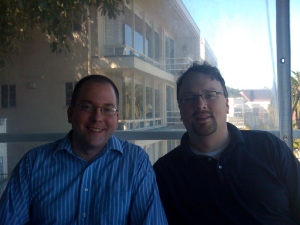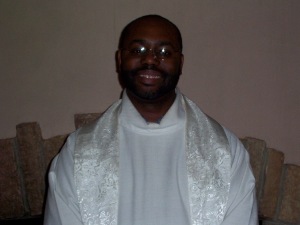 |
| Jim, left and my partner, Daniel, right. |
As First Christian plans its future, a constant among the plans is to leave some money aside for to plant new churches. Both the Senior Pastor and I have made this a priority in what ever decisions are made.
That has been met with some resistance. One person wondered why we weren't spending some of the money on mission. Others have thought the same thing. (It's funny that people all of the sudden care about mission when it comes to using money for church planting.) I'm always a bit angry at the resistance to planting churches. As someone whose position involves mission, I get wanting to support mission, but church planting is part of that mission.
Of course, I have a strong belief in planting new churches, because I planted one. Yes, it failed but it also made a difference in the life of one man, my dear friend Jim.
Jim came from a Catholic and Anglican background, but because he was gay, he never felt welcomed in those churches. When Community of Grace came online, he was able to reconnect with God in a way that continues today.
I don't know if Jim would have come back to the church if it was an existing church. But because there was a new church that welcomed him regardless of his sexuality, he could come on in and meet Jesus.
I know that at First part of the resistance is that many of churches planted by the congregation have since closed. But just because a congregation is no longer in existence that doesn't mean that planting it was in vain. Countless people were able to learn the stories of old, feast at the table, make a baptismal covenant and meet Christ. That matters.
I wonder at times if part of the resistance to new planting new churches comes from what has happened to mainline Protestant churches over the last 50 years. Walter Russell Mead writes that as the fundamentalists/evangelicals split from the modernists in the early 20th century, it was the modernists that ended up much poorer:
In a sense, the mainline churches today suffer because they never took stock of the costs of modernism in quite the same way that evangelicals came to terms with some of the shortcomings and one-sided characteristics of the fundamentalist movement. Beginning really with Billy Graham’s pilgrimage, for two generations evangelicals have been working to free themselves of cultural detritus (culturally determined views on race and on the place of women in society, for example) while holding on to the vital principles of the fundamentalist core — doctrines like original sin, the atonement, and a strong belief that God, however mysteriously, acts in history.
The heirs of the modernists, I fear, have not really had this ‘second stage’ movement. If anything, the most noticeable trend in many mainline denominations has been to go farther down the road of the modernists. Reinhold Niebuhr, a figure who in many ways came closer than any other to the kind of review and renewal that mainline Protestantism needs, would be politically and theologically isolated in the mainline churches today. His stance suggested a rigorous and critical approach to the limits of liberal theology, but that side of his legacy has been largely ignored.
Niebuhr in a sense has had no heirs. His effort to synthesize the core vision of historic Protestantism with a contemporary sensibility did not capture the imagination of subsequent generations of mainline church leaders. The mainline churches seemed to feel that little of value was really lost when the fundamentalists left. The modernists won the fight with the fundamentalists, after all. They ended up with the big buildings, the prestigious and academically well respected theological schools, the patronage of the social elite, the bully pulpits that commanded attention and respect, the control of the denominational machinery. Why look for anything more?
In truth, the split impoverished the mainline churches as much as it did the fundamentalists. Modernity in religion became progressively unglued from the foundations of Protestant faith; the mainline churches lacked the kind of compelling, burning message of faith that would have kept new generations of educated, thoughtful believers engaged in the church. For too many mainline congregations, faith faded into a habit, and the habit faded away.
While many people in the mainline churches continue to live rich and intense spiritual lives, the mainline churches as a group seem to have lost both the urge and the ability to communicate a message of urgency about the need to people to, as the old spirituals put it, “get right with God.” They have lost the ability to make the Christian life and a Christian commitment the vital center of community and family life — even for many of their own members.
Mainline churches have always been good when it comes to social justice, but when it comes to what drives us, the passion of Christian committment, well, not so much. I think part of the reason there seems to be little urgency when it came to church planting is because it seems so old fashioned. We mainliners don't want to look like those fundamentalists, trying to shove their faith down people's throats.
And of course, please have done that. But our approach hasn't been a whole lot better. At times it seems like we have no passion, that we are going through the motions.
This isn't what I'm used to. I grew up in the African American church and I can tell you that they had a lot of passion. And yet, that bothers white mainline Protestants. Yes, the will try to enjoy a black church service, but the urgency, the passion is just not there.
I came accross this post a few weeks ago by Presbyterian pastor John Vest explaining his experience at Presbyterian Youth Triennium:
For the most part, I really enjoyed Triennium. I found a lot of it very inspiring and energizing. I enjoyed meeting and reconnecting with youth ministry friends. It was a great opportunity for me to feel the pulse of Presbyterian youth ministry around the country. Yet, some of it just didn’t connect for me. Though I approached this experience with an open heart and an open mind, I have to say that some of it was just not my cup of tea—and it wasn’t always a great fit for the youth I brought from Chicago.
Part of this is a cultural thing that I think is more regional than anything else. By and large, Chicago Presbyterians are not accustomed to this kind of flashy, semi-evangelical youth conference. I think this is why we have (in my opinion) a hard time putting on Presbytery youth conferences back home: we use this same model but it doesn’t connect with the youth group experiences of most of our churches.
But part of it is also a theological difference, or at least a difference of emphasis—which is probably connected to these regional cultural differences as well. Our kids have not had a lot of exposure to youth that wear Christian t-shirts, listen to Christian music, and “talk the talk” of (semi-)evangelical youth culture. They were a little weirded out by all the screaming and shouting about Jesus. In general, the constant emphasis on Jesus in worship, music, and small groups was more than they are used to.
As a recovering Southern Baptist who used to very much inhabit this culture and who left it for many good reasons, it was all a little more than I was interested in as well. I was most troubled by the music during daily worship. The rock band was excellent. And overall, worship was very creative and was quite inclusive and in some (sometimes subtle) ways progressive. But the music and the music leaders used pretty much exclusively male language to talk about God. Most of the songs were more christocentric than theocentric, and usually really christocentric. There was a whole lot of what I began thinking of as “Jesus, bloody Jesus”: a high christology that was almost exclusively informed by a theology of bloody, sacrificial atonement. This kind of christology was so thick that when Tony Campolo preached about a radical, earthy Jesus (you know, the one we read about in the synoptic gospels) during our final worship service, it almost seemed to me like a different Jesus than the one we had been singing about all week. (You can guess which Jesus I found more compelling.)
All of this stirred within me thoughts I have been having for a while about what I think is an idolatrous attitude toward the worship of Jesus in most circles of the church today. I’ll write more about this later, but here is the tension I felt at Triennium: there seems to be a huge disconnect between the Jewish peasant that preached humility, servanthood, and a paradoxical embrace of power through weakness and 5000 youth in an auditorium using flashy rock music, t-shirts, and signs to worship and exalt a Christ that reigns in power and is somehow involved in every aspect of creation. Would Jesus point to himself in this way, or would he instead point us to God? This, of course, is a sticky question of christology, a question I fully intend to return to. But for now, I have to confess that this kind of Jesus worship just doesn’t seem to me like the kind of thing Jesus lived and died for. If Jesus wanted this kind of worship, he could have asked for it while he was with us.
Now, I get and appreciate the "earthy Jesus" he is talking about. I think it is incredibly important to understand the life of Jesus, not just his death.
But I also understand the "Jesus, bloody Jesus" as well. The life of Jesus tells us how we should live. But it is the death of Jesus that allows us to follow Jesus. Following the earthy, Jewish peasant is something we can do, kinda like I can choose to become a vegetarian. Both are good, but they aren't necessarily passionate. But there's a reason the crucifixion and death of Jesus is called "The Passion." There was emotion involved. It affected people, it changed them. It still does today.
In the African American church, we sing songs that talk a lot about blood, the blood of Jesus. It might seem goulish, but we realize that it was this blood that saved us, that saved us all to be servants to each other. I don't know, but maybe the experience of slavery made us less squeamish about blood and make Christ seem more urgent.
So, what does this little theological trip have to do with church planting? Well, if Jesus is just the earthy prophet, then I don't really see the need to plant churches. Hell, I don't even need a church. I can just give money to an agency and spend time at a soup kitchen. But if Jesus is the One who came and lived among us, cared for the poor, healed the sick, made the blind see and also died for us and rose up to defeat the powers of death, well that sounds a lot more exciting, doesn't it? Kinda like you want to be in church.
Church planting matters because Jesus matters. Jesus changes lives. He brought my friend Jim back to a church. Jesus matters. Let's plant churches.


